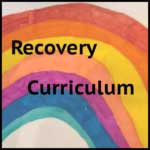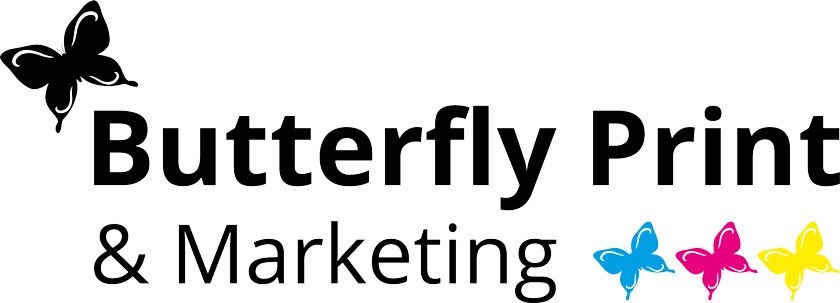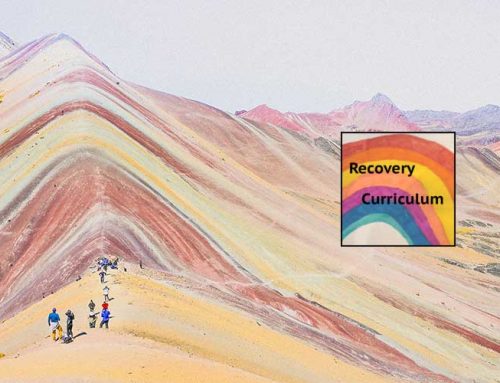 [Originally posted on Evidence for Learning 17 June 2020]
[Originally posted on Evidence for Learning 17 June 2020]
In this episode we have a presentation and talk from Amanda Mordey, OBE.
Three years ago, Forest Oak School, of which Amanda is Executive Principal (alongside Merstone School,) developed SMILE, an ethos based approach to promoting positive mental health and well being for children with special educational needs and disabilities (SEND). The approach took the NHS 5 Ways to Well Being, and adapted them into child speak, augmenting the key messages with pictures, drawn by a student. The approach was holistic and included all staff members as well as pupils.
Building on the positive outcomes for Forest Oak school, Amanda commissioned a 2 year evidence based trial of SMILE across 10 Primary and Special Schools. Each participating school has found a significant shift in the culture of the school, and that SMILE has enabled them to put the well being of the whole school community at its heart.
We are delighted that Amanda has chosen to launch SMILE for wider use in Education, through the Recovery Curriculum website (see below), as a constructive contribution to the response schools are making to the pandemic.
There has never been a more crucial time to support our schools and equip our teachers, to build emotional resilience in our children & young people.
The mental health of our children is eroding before our eyes…we need to bring back their SMILE. These are perfect resources for implementing a Recovery Curriculum .
– Professor Barry Carpenter, CBE, PhD, Professor of Mental Health in Education, Oxford Brookes University. (January 2020)
Episode 9: A Recovery Curriculum #9 – Amanda Mordey OBE
The title and theme of Amanda’s presentation is: SMILE: A Well Being Approach… A Route to Recovery
The video below contains the audio from LearningShared Episode 9 with visual slides from the presentation.
We’ve listed below links to some of the references that Amanda makes in the presentation.
‘Happiness Boxes’
Amanda refers to how they have created Happiness Boxes for all of the pupils. Here is a how to make a Happiness Box, with a sound rationale for doing so. Written by Barry Carpenter and Bev Cockbill this step by step guide is perfect for welcoming children and young people back to school, or for home learning. In either contexts it enables the child to build their emotional resilience, and self regulate their emotional well being.
Rationale for the Happiness Box and how to make it (PDF Copy)
Butterfly Print
Use the discount code “MHPOST” to receive a 10% discount (limited time offer); click here for SMILE Resources.
A closing word from the pupils at Forest Oak School…
The pupils at Forest Oak School have been using their feelings during the Coronavirus pandemic to create a song for everyone. The vocals in this song were recorded by pupils following safe guidelines. The photos in this video are of children working from home, unable to attend school and of some of the changes made to the school. We hope you enjoy it.

About Amanda Mordey OBE
Amanda has worked for over 30 years in the field of special education. Over 28 years as a school leader, 25 years as Head Teacher.
She is Principal of two special schools in Solihull – Merstone School, catering for pupils aged 2-19yrs with severe and complex learning disabilities and Forest Oak school, catering for pupils aged 4 – 18 yrs with moderate learning disabilities.
She has a keen interest in the mental health and well-being of the school community. In 2014 Forest Oak worked with Solihull Advisory Team on a research project and the SMILE approach was developed. SMILE is an ethos-based approach to supporting the pupils, staff and families based on the NHS 5 areas to well-being. She has worked with her skilled staff to develop a well-being/ Recovery curriculum to support the pupils on their transition back into school. The SMILE approach has continued to support the community through the pandemic and during recovery.
For further details about Forest Oak School and SMILE: https://www.forest-oak.solihull.sch.uk
https://www.forest-oak.solihull.sch.uk/topic/smile
Barry Carpenter’s website: https://barrycarpentereducation.com
Join the conversation about The Recovery Curriculum:
Clearly any form of Recovery Curriculum will need to be unique to each and every school, contextualised to the ethos, culture and values of that school, as well as its existing curriculum and crucially reflecting and addressing the needs and aspirations of its unique population of learners.
We have created private groups in LinkedIn and Facebook where colleagues and peers can discuss and share thoughts, ideas, experiences, resources and learning in relation to education and provision post pandemic. The groups are also an opportunity to connect people and help you to build a network that can support you on your own important journey over the coming months.
 Facebook Group: Recovery Curriculum
Facebook Group: Recovery Curriculum
We’ve set up a private facebook group specifically for The Recovery Curriculum at: https://www.facebook.com/groups/recoverycurriculum
or search for “recoverycurriculum” in Facebook.
Facebook: EfL SEND Community Group
Join us at: https://www.facebook.com/groups/eflSENDCommunity/ or search for “eflSENDCommunity” in Facebook.
The purpose of the group is to provide a safe, closed space to seek out and share ideas, experience and resources that can help with any and all aspects of SEND provision. It’s also a community for practitioners and schools that use Evidence for Learning and Insights for Learning to share ideas, resources and support each other in using these apps. This is a peer-moderated and supported group.
 Linkedin Group: The Recovery Curriculum
Linkedin Group: The Recovery Curriculum
The group is called “A Recovery Curriculum for children & schools post-pandemic” and you can find it at: https://www.linkedin.com/groups/12399451/



Leave A Comment
You must be logged in to post a comment.